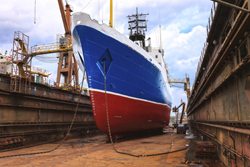Optimising ship maintenance
Ships are structures of mainly steel, operating in a highly corrosive environment that also causes metal flexing. Thus, ships need considerable inspection, which is generally done according to average guidelines and without consideration for the circumstances of any particular ship. As a result, certain ships may receive less attention than warranted, increasing the risk of structural failure. Helping to fix this problem was the RISPECT(opens in new window) project. Consisting of 11 partners from 6 EU countries, the consortium-led project ran from October 2008 to March 2013and aimed to provide a better methodology for ship assessment. Traditionally, ship inspections would be scheduled in a standard way based on average needs for a given ship class. Alternatively, individual ship parts considered at risk may be inspected as needed. Both methods are unsatisfactory in some ways. The project's new method combines the best features of both, incorporating statistical analysis of long-term experience from many ships with risk-based methods. The result is a process that gives justifiable risk-based inspection schedules, meaning a superior rate of defect detection. The project delivered all 14 of the outputs it undertook. These include a methodology uniting the two main kinds of ship inspection protocols. RISPECT's process specifies codes for various kinds of ship damage such as corrosion, cracks and coating breakdowns. RISPECT also devised tools for assessing such damage. Including results of structural, reliability and risk analyses, the project's process enables acquisition, storage and more effective use of inspection data. A major component of the work was a large database, the structure and reports of which the project defined. The result is a justifiable decision-making process for the structural management of ships throughout their working lives. Outcomes of the RISPECT project will be an accepted methodology for scheduling inspections for ship damage. That will mean safer ships and fewer shipping accidents, potentially avoiding environmental or other disasters, and financial losses.







